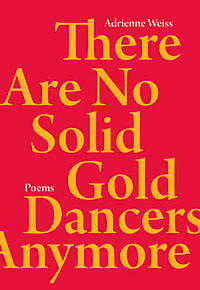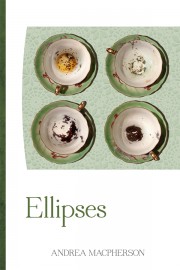Reviews
Poetry Reviews by Rebecca Geleyn
Adrienne Weiss, There Are No Solid Gold Dancers Anymore (Gibsons: Nightwood, 2014). Paperbound, 80 pp., $18.95.
Andrea MacPherson, Ellipses (Winnipeg: Signature, 2014). Paperbound, 96 pp., $14.95.
Andrea MacPherson and Adrienne Weiss have turned out beautiful new collections of poems that dig deep into the themes of memory and nostalgia. Other than this connecting thread, the two books drive their energies in nearly opposite directions. Adrienne Weiss’ There Are No Solid Gold Dancers Anymore erupts into spirited interchanges of lost stardom and shards of past dreams, alluding to Princess Diana and kitschy eighties television shows while tapping into a cultural longing for the days of one’s youth. MacPherson’s Ellipses, on the other hand, denotes its own restraint and minimalism through its title: these poems are deceptively simple voices of the past, voices prompted from the intricate details of a black-and-white photograph, not from Technicolor bravado. While adopting different attitudes, both poets’ skill with language certainly matches the ambition of their collections.
Weiss divides her book into three sections, with themes that easily cross over into  various poems. The first section, “The Future Comes Anyway” deals with the recklessness of destiny (or perhaps just plain causality). “Fortune’s Wheel” cleverly romanticizes the television game show The Price is Right from the perspective of a woman or man, presumably living in suburbia, who needs “a third coffee to awaken the day’s / plans, throw open the sun.” This character still waits for “Luck” in the midst of prosaic domesticity, a land of lucklessness where “a neighbour’s / ferocious fake tan blinds the squirrels.” In the book’s most mythological section, Weiss turns her sharp wit to imaginative re-creations of The Wizard of Oz—an exploration of representation, the art and culture of acting, and the difficulties of finding one’s sense of place within a story. The tale in “The Lion’s Courage” is particularly poignant:
various poems. The first section, “The Future Comes Anyway” deals with the recklessness of destiny (or perhaps just plain causality). “Fortune’s Wheel” cleverly romanticizes the television game show The Price is Right from the perspective of a woman or man, presumably living in suburbia, who needs “a third coffee to awaken the day’s / plans, throw open the sun.” This character still waits for “Luck” in the midst of prosaic domesticity, a land of lucklessness where “a neighbour’s / ferocious fake tan blinds the squirrels.” In the book’s most mythological section, Weiss turns her sharp wit to imaginative re-creations of The Wizard of Oz—an exploration of representation, the art and culture of acting, and the difficulties of finding one’s sense of place within a story. The tale in “The Lion’s Courage” is particularly poignant:
just sing to give the impression
we exist, I exist, after Oz. But
life still mistakes me for that lion
galumphing to Arlen and Harburg as
Judy looks into my winking eye, her
gait heavy upon the yellow brick.
The Wizard of Oz poems could have turned out syrupy and cloying; instead they are sorrowful, moving, and dreamlike, always with the touch of humour that ties the frivolous to a deep ache.
Weiss’ final section, “The Small Part of the Universe,” continues travelling through a variety of poetic stimuli. Poem after poem digs through objects of desire, and each burrows into a seductive nostalgia—the kind that leads you to listen to your favourite bittersweet rock ballad on repeat. Particularly stunning is the specificity of Weiss’ allusions, objects that become cultural touchstones of a time and place: Doritos, watermelon Hubba Bubba, choker necklaces, Oprah, Orange Crush, a Polaroid photograph with the inscription “Best friends forever.” And for Weiss, life-changing revelations materialize in the clumsy, inopportune moments: “On Liberty Street it suddenly hits me: There are no Solid Gold dancers anymore. Then I get hassled for change outside the textile merchant’s store I’ve been thrown out of for dropping ribbon spools and making a fine mess, Thank you very much” (“There Are No Solid Gold Dancers Anymore”). For all its allusive bells and whistles, Weiss’ collection uncovers a complex human experience filled with aspirations, cravings, and disappointments.
If Weiss gives her reader a burst of sparkles from the past, MacPherson instead  offers the hushed narratives of women, retrieved amidst other shouted histories. Spurred by the death of her two grandmothers, the poet imagines their lives, full of family hardships and intricate happiness. These stories flow seamlessly into poems from the perspectives of other women: alternative archives for both fictional and historical people, including Shakespeare’s Ophelia, Sylvia Plath, Bluebeard’s wife, and a model for E. J. Bellocq’s photographs.
offers the hushed narratives of women, retrieved amidst other shouted histories. Spurred by the death of her two grandmothers, the poet imagines their lives, full of family hardships and intricate happiness. These stories flow seamlessly into poems from the perspectives of other women: alternative archives for both fictional and historical people, including Shakespeare’s Ophelia, Sylvia Plath, Bluebeard’s wife, and a model for E. J. Bellocq’s photographs.
MacPherson’s poetic method is a kind of slow archaeology: she sweeps away the dust of history. Whenever her effortless diction flirts with flatness or cliché she inscribes a brilliant turn of phrase, such as her description of a party dress in “black and white photo, years later.” “Later, it hung in the closet / (still smelling of smoke and perfume, / mixed liquor) / reminding you that—once— / your waist was a whisper of a palm-span.” MacPherson is interested in fortunes and futures, relating how her grandmother used to read tea leaves, and how, as a child, she thought this ability was passed on “like inheritance” (“reading tea leaves”). In this collection, generations do, in fact, pass down their experience of language. The book’s meditative opening poem, “the genesis of elocution,” depicts an ancestor “at seventeen / when words appeared like dreams / to rumble through her mind / and land in her mouth,” while the poem “turning the clocks ahead” examines the friction between the poet’s own experience of motherhood and writing: “I will give her all these words happily, / with great, greedy pleasure, / but still wonder where my own words have gone.” This strand of continuity between past and future generations leaves stunning, contemplative imprints of the past on each poem. MacPherson’s version of memory is heavy and heady; Ellipses recollects the lived histories of women and their aspirations of autonomy.
—Rebecca Geleyn









